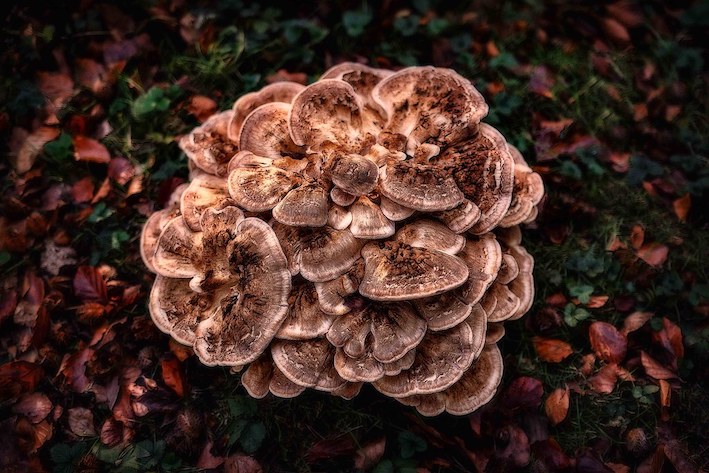What Is Maitake?
And, as there is so much to be said about each one, we have decided to put our favorite superfood superstars under the spotlight, so you can really get to know them. We’ve already tackled Lion’s Mane, Reishi, Turkey Tail, Shiitake, Chaga and Cordyceps but now it’s time for another fungi…
The Maitake mushroom! This awesome mushroom has been used in Japanese and Chinese medicine for centuries due to its manifold health benefits, however, it has only become more widely known in the West in the past couple of decades. Even now it is one of the lesser known of the medicinal mushroom crew, despite its wellness-boosting credentials. So lets get friendly with this forest-loving fungi, and see how you could benefit from introducing it to your routine today!

‘Hen of the Woods’
This mushroom grows wild at the base of the Maple, Elm and Oak trees of China, Japan and North America. It can be cultivated at home, however it does not flourish as readily as in nature. It tends to appear in autumn, and is the owner of many affectionate nicknames such as ‘hen of the woods’, ‘sheeps head’, ‘king of mushrooms’ and ‘dancing mushroom’ — the folklore being that foragers would dance with joy on finding a crop of them, such was the belief in their medicinal credentials. Maitake is an attractive mushroom, part of the Polyporales family with fronds that echo layers of bird feathers.
A Natural Adaptogen
The maitake mushroom is known to be an adaptogen. According to plant-based and herbal medicine practices, an adaptogen is a naturally occurring substance that can help to adapt the body to different stressors. Different adaptogens excel at treating different elements of the body. However, all interact with the hypothalamic-pituitary-adrenal (HPA) axis and the sympathoadrenal system, which are both involved in the body’s response to stress. It can be compared to physical exercise to train your body — over time you become stronger and your stamina increases. With adaptogens you are training your body to be able to the handle stressors — emotional, physical, biological — that life may throw at you.

5 Health Benefits of Maitake Mushroom
They Could Aid Cancer Prevention and Treatment
Although research is still in early stages, studies have shown that maitake could have cancer preventing and treating properties.
A 2013 study on mice found that maitake could suppress tumour growth and even increase cancer fighting cells. This is a promising result for future human treatments.
A maitake extract, called D-Fraction, when studied in 2013 was found to have potential uses as a breast cancer treatment and prevention tool. Additionally, a 2012 study found that when paired with a cancer fighting protein, D-Fraction increased the protein’s overall effectiveness.
Supports The Immune System
In line with its traditional uses in Asia, maitake has been found to have immune boosting and supportive properties. The mushroom contains beta-glucan, a polysaccharide that facilitate a healthy immune system. It has also been shown to increase the production and the activity of white blood cells. A study on mice, which administered extract of maitake and shiitake, found that after 2 weeks an increase in ‘defence reaction’ could be observed.
Could Help With Diabetes Management
Maitake has been found to have an effect and blood sugar levels, which could aid diabetes management and prevention. Various studies have found that maitake extract can improve insulin resistance in mice. If he same result can be found in future human tests, the onset of type- 2 diabetes itself could be side-stepped, as is this triggered by the body no longer being able to react properly to insulin. Additionally, it could be used to help those already living with diabetes to manage the condition. A World Journal of Diabetes study from 2020 found that maitake extract could be “a safe, natural agent for lowering the serum glucose levels in type 2 diabetic patients and improving their diabetic conditions.”
Good for Cholesterol Levels
Early studies have shown that maitake could help lower cholesterol levels. A 2011 study published in the Journal of Agriculture and Food Chemistry which gave laboratory animals a maitake supplement for 4 weeks found that the animal’s liver cholesterol was indeed lowered. This was identified to be occurring at the genetic level as the activity of the genes that promote lipid (fat) transport was increased. As a control in the study, beech mushroom was also tested and produced no such cholesterol lowering effects. Additionally, the polysaccharides in maitake are able to target LDL cholesterol (the bad stuff) without reducing your HDL cholesterol (the good stuff).
High in Antioxidants
Maitake is high in antioxidants. These are key for many different areas of the body, including the brain and the heart. In the brain antioxidants are shown to reduce oxidative stress. This is a type of stress that can affect memory and cognitive function. Oxidative stress is also bad for your heart, affecting your cardiovascular health. Too much oxidative stress in the body is associated with stroke, heart disease, some cancers, and respiratory and inflammatory conditions. Adding the antioxidants associated with the maitake mushroom could help combat these conditions.
How To Take Maitake Mushroom
One of the great things about maitake mushroom is that it is edible — and tasty! It has an earthy, peppery flavour and a juicy, chewy texture. It’s delicious cooked any style and can feature on any dishes you might add mushrooms to such as risotto, pizza or pasta. A low in fat and vitamin rich food, it would be worth adding to your diet even without its manifold health benefits!

Maitake can also be taken as a tea or as a dried extract in capsule form. Whichever way works best for you! Combined with a healthy diet and lifestyle the maitake mushroom is a key part of any wellness routine.
Note: Maitake should not be used instead of traditional medicines — rather as an add-on. Please talk to your doctor before making any substantial changes to your health regime.





